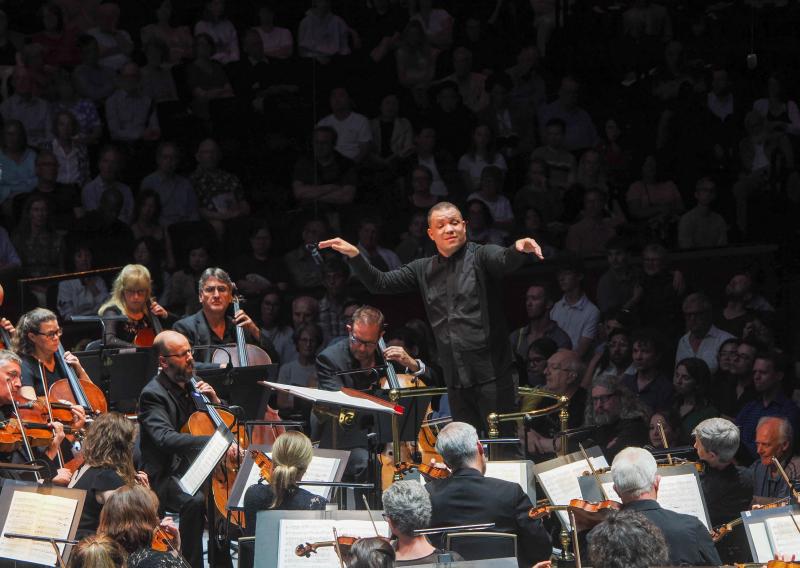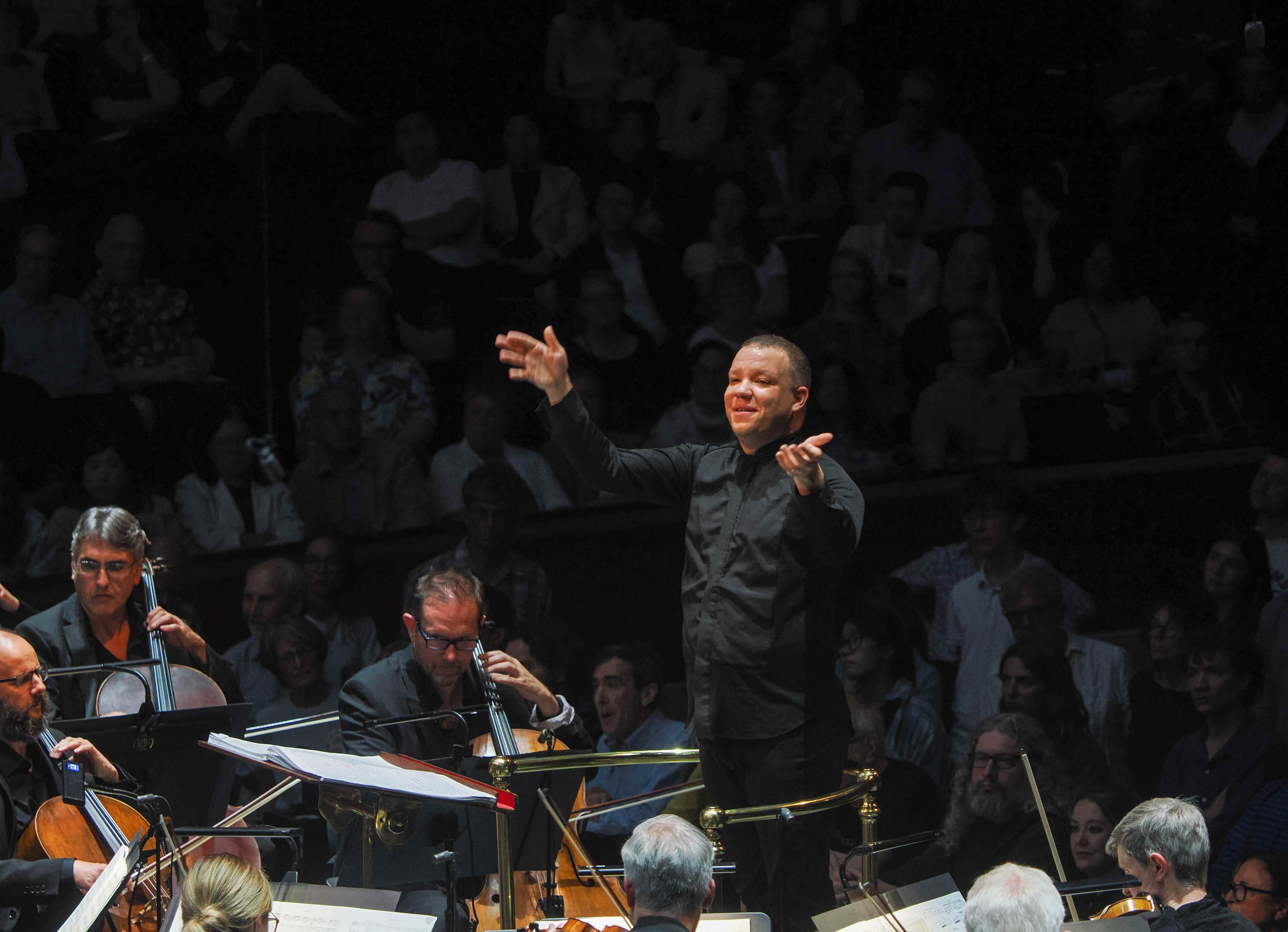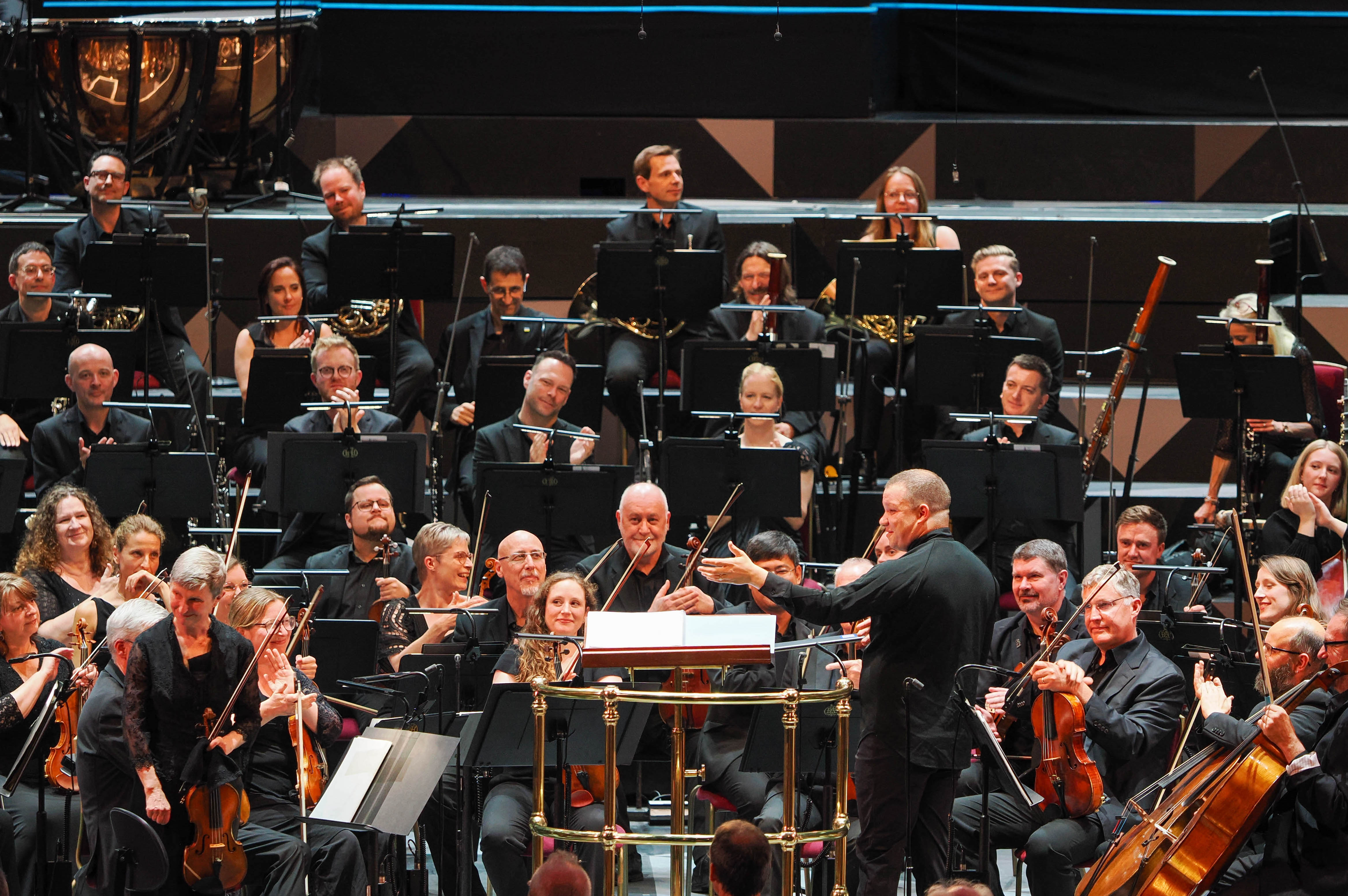Prom 5, BBC National Orchestra of Wales, Bancroft review - a luxury orchestral cruise | reviews, news & interviews
Prom 5, BBC National Orchestra of Wales, Bancroft review - a luxury orchestral cruise
Prom 5, BBC National Orchestra of Wales, Bancroft review - a luxury orchestral cruise
Two lavish fin-de-siécle fantasias return to life

This looked like a classic Prom in the grand old BBC tradition: two big but lesser-known pieces by pivotal figures (Schoenberg and Zemlinsky) played by a major non-metropolitan ensemble, the BBC National Orchestra of Wales. And so it proved, with powerful, refined and meatily satisfying versions of Arnold Schoenberg’s Pelleas and Melisande and Alexander von Zemlinsky’s The Mermaid conducted by the NOW’s chief, Ryan Bancroft.
Here, surely, where entertainment meets enlightenment, the Proms heartland used to lie. But, on a perfect July evening, the house was much sparser than it should have been. True, neither work enjoys a mass fan-base. Even the sumptuously melodic young Schoenberg can deter some fainthearts. Still, you wonder whether the stalwart solid core of rain-or-shine, up-for-anything Proms audiences has now crumbled away to a critical extent. If so, will anyone bother to rebuild it?
Those who came were rewarded with a pair of full-fat, high-calorie symphonic poems that teeter gorgeously between the late-Romantic past and the harmonically experimental future. Zemlinsky was Schoenberg’s brother-in-law, and the lover of Alma Schindler before she took up with Gustav Mahler; these pieces appeared on the same programme at a Viennese concert in 1905. Zemlinsky’s Mermaid, inspired by Hans Christian Andersen’s fairy-story, then disappeared until its rediscovery in 1984. So, under Bancroft’s guidance, the Albert Hall became a time machine that whisked us back to a febrile fin-de-siècle sound world (both works were written around 1902) in which Romantic orchestration ripens lusciously – and maybe rots – on dark symbolic trees.
The NOW came mob-handed to Kensington, their full-strength forces – with tutti power to match – spread generously over the hall’s broad slopes. However, not even in the most resonant climaxes did Bancroft (pictured below) simply dunk us in a blurry wash of sound. From eerie woodwinds to sinister brass, his individual voices spoke up clearly. And the tempi avoided any unduly languid stretches.  Before the interval, Schoenberg’s response to Maurice Maeterlinck’s chivalric Symbolist drama – an inspiration too for Debussy, Fauré and Sibelius – turned out to be the more radical half of this opulently-dressed couple. To begin with, the orchestration feels anxious and angular, jarringly unsettled rather than indulgent. Bancroft’s direction had a brisk nervous tension that prevented any cloying, clotting drag. The play’s Wagnerian love-triangle licenses surging, sensuous strings, ominous forest murmurs in the woodwinds, and crunchy, snorting violence from the massed brass – especially Donal Bannister’s menacing trombones.
Before the interval, Schoenberg’s response to Maurice Maeterlinck’s chivalric Symbolist drama – an inspiration too for Debussy, Fauré and Sibelius – turned out to be the more radical half of this opulently-dressed couple. To begin with, the orchestration feels anxious and angular, jarringly unsettled rather than indulgent. Bancroft’s direction had a brisk nervous tension that prevented any cloying, clotting drag. The play’s Wagnerian love-triangle licenses surging, sensuous strings, ominous forest murmurs in the woodwinds, and crunchy, snorting violence from the massed brass – especially Donal Bannister’s menacing trombones.
The NOW’s playing, clean-edged and rich-toned, brought clarity to the mystery, even if Schoenberg’s enraptured wander through an enchanted forest of orchestral effects tends to lose itself in tangled chromatic thickets. Neither too thin nor too heavy, Bancroft’s textures let us contemplate the wider wood among the dense trees. Horns snarled, oboes pined and timpani notably thundered. We could hear an entire harmonic order, like the play’s divided characters themselves, on the brink of breakdown but still game for these grand gestures of farewell.
In contrast, Zemlinsky’s three-movement Mermaid fantasia felt not like another giant dose of Viennese lyric anguish but the surprising herald of another kind of musical future. From swelling brass to gurgling woods, the sea-pictures it draws are more obviously picturesque, more charmingly scenic and less darkly introspective. Hearing the tenderly pleasing solo flourishes from the NOW leader, Lesley Hatfield (pictured below), I recalled that Zemlinsky taught Erich Korngold. At points the shadow of Hollywood blockbusters to come seems to fall across this score; you almost expect Errol Flynn to clamber down the rigging, cutlass in hand.  Zemlinsky at this stage did have inclinations more traditional – and therefore, arguably, more modern – than his soon-to-be revolutionary brother-in-law. Rocking brass and shimmering strings helped Bancroft communicate the rhapsodic, swashbuckling mood of a piece that carries its debt to Wagner more cheerily than Schoenberg ever does.
Zemlinsky at this stage did have inclinations more traditional – and therefore, arguably, more modern – than his soon-to-be revolutionary brother-in-law. Rocking brass and shimmering strings helped Bancroft communicate the rhapsodic, swashbuckling mood of a piece that carries its debt to Wagner more cheerily than Schoenberg ever does.
Indeed, the swaggering horns of the scherzo-like second movement have a sort of Warner Brothers cheek. Flavoursome contributions from flute, oboe and cellos add to the zest and fun – though for all Bancroft’s vigour, vigilance and commitment, this fairytale escapade does rather outstay it welcome. Think of the nautical miles of thematic invention that Richard Strauss (the other obvious comparator) can cover in 20 minutes, as opposed to than 40.
That said, the Mermaid made for a delightful cruise with a stylish and skilful captain and crew. Grander bands will visit the Albert Hall this summer, but few will deliver a more pleasurably rich and balanced sound. A shame, though, that so many berths went unoccupied on board. The Proms will surely founder if its public turns away from voyages of discovery.
rating
Share this article
The future of Arts Journalism
You can stop theartsdesk.com closing!
We urgently need financing to survive. Our fundraising drive has thus far raised £49,000 but we need to reach £100,000 or we will be forced to close. Please contribute here: https://gofund.me/c3f6033d
And if you can forward this information to anyone who might assist, we’d be grateful.

Subscribe to theartsdesk.com
Thank you for continuing to read our work on theartsdesk.com. For unlimited access to every article in its entirety, including our archive of more than 15,000 pieces, we're asking for £5 per month or £40 per year. We feel it's a very good deal, and hope you do too.
To take a subscription now simply click here.
And if you're looking for that extra gift for a friend or family member, why not treat them to a theartsdesk.com gift subscription?
more Classical music
 Hallé John Adams festival, Bridgewater Hall / RNCM, Manchester review - standing ovations for today's music
From 1980 to 2025 with the West Coast’s pied piper and his eager following
Hallé John Adams festival, Bridgewater Hall / RNCM, Manchester review - standing ovations for today's music
From 1980 to 2025 with the West Coast’s pied piper and his eager following
 Kaploukhii, Greenwich Chamber Orchestra, Cutts, St James's Piccadilly review - promising young pianist
A robust and assertive Beethoven concerto suggests a player to follow
Kaploukhii, Greenwich Chamber Orchestra, Cutts, St James's Piccadilly review - promising young pianist
A robust and assertive Beethoven concerto suggests a player to follow
 Robin Holloway: Music's Odyssey review - lessons in composition
Broad and idiosyncratic survey of classical music is insightful but slightly indigestible
Robin Holloway: Music's Odyssey review - lessons in composition
Broad and idiosyncratic survey of classical music is insightful but slightly indigestible
 Classical CDs: Wolf-pelts, clowns and social realism
British ballet scores, 19th century cello works and contemporary piano etudes
Classical CDs: Wolf-pelts, clowns and social realism
British ballet scores, 19th century cello works and contemporary piano etudes
 Bizet in 150th anniversary year: rich and rare French offerings from Palazzetto Bru Zane
Specialists in French romantic music unveil a treasure trove both live and on disc
Bizet in 150th anniversary year: rich and rare French offerings from Palazzetto Bru Zane
Specialists in French romantic music unveil a treasure trove both live and on disc
 Scottish Chamber Orchestra, Ibragimova, Queen’s Hall, Edinburgh review - rarities, novelties and drumrolls
A pity the SCO didn't pick a better showcase for a shining guest artist
Scottish Chamber Orchestra, Ibragimova, Queen’s Hall, Edinburgh review - rarities, novelties and drumrolls
A pity the SCO didn't pick a better showcase for a shining guest artist
 Kilsby, Parkes, Sinfonia of London, Wilson, Barbican review - string things zing and sing in expert hands
British masterpieces for strings plus other-worldly tenor and horn - and a muscular rarity
Kilsby, Parkes, Sinfonia of London, Wilson, Barbican review - string things zing and sing in expert hands
British masterpieces for strings plus other-worldly tenor and horn - and a muscular rarity
 From Historical to Hip-Hop, Classically Black Music Festival, Kings Place review - a cluster of impressive stars for the future
From quasi-Mozartian elegance to the gritty humour of a kitchen inspection
From Historical to Hip-Hop, Classically Black Music Festival, Kings Place review - a cluster of impressive stars for the future
From quasi-Mozartian elegance to the gritty humour of a kitchen inspection
 Shibe, LSO, Adès, Barbican review - gaudy and glorious new music alongside serene Sibelius
Adès’s passion makes persuasive case for the music he loves, both new and old
Shibe, LSO, Adès, Barbican review - gaudy and glorious new music alongside serene Sibelius
Adès’s passion makes persuasive case for the music he loves, both new and old
 Anja Mittermüller, Richard Fu, Wigmore Hall review - a glorious hall debut
The Austrian mezzo shines - at the age of 22
Anja Mittermüller, Richard Fu, Wigmore Hall review - a glorious hall debut
The Austrian mezzo shines - at the age of 22
 First Person: clarinettist Oliver Pashley on the new horizons of The Hermes Experiment's latest album
Compositions by members of this unusual quartet feature for the first time
First Person: clarinettist Oliver Pashley on the new horizons of The Hermes Experiment's latest album
Compositions by members of this unusual quartet feature for the first time

Add comment